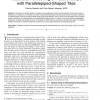Free Online Productivity Tools
i2Speak
i2Symbol
i2OCR
iTex2Img
iWeb2Print
iWeb2Shot
i2Type
iPdf2Split
iPdf2Merge
i2Bopomofo
i2Arabic
i2Style
i2Image
i2PDF
iLatex2Rtf
Sci2ools
122
click to vote
TPDS
2002
2002
Automatic Partitioning of Parallel Loops with Parallelepiped-Shaped Tiles
In this paper, an efficient algorithm to implement loop partitioning is introduced and evaluated. We start from results of Agarwal et al. [1] whose aim is to minimize the number of accessed data throughout the computation of a tile; this number is called the cumulative footprint of the tile. We improve these results along several directions. First, we derive a new formulation of the cumulative footprint, allowing for an analytical solution of the optimization problem stated in [1]. Second, we deal with arbitrary parallelepipedshaped tiles, as opposed to rectangular tiles in [1]. We design an efficient heuristic to determine the optimal tile shape in this general setting and we show its usefulness using both examples from [1] and a large collection of randomly generated data.
Related Content
| Added | 23 Dec 2010 |
| Updated | 23 Dec 2010 |
| Type | Journal |
| Year | 2002 |
| Where | TPDS |
| Authors | Fabrice Rastello, Yves Robert |
Comments (0)

